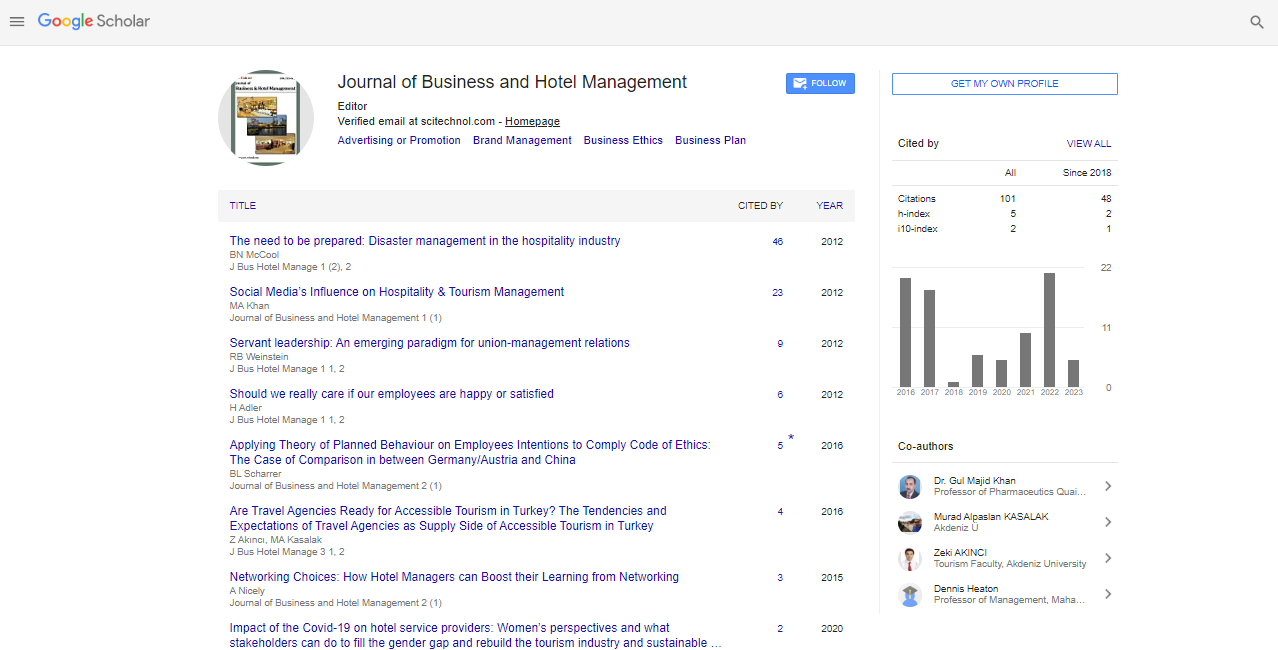Perspective, J Bhm Vol: 9 Issue: 2
Effective Hotel Administration: Key Strategies for Optimal Guest Experiences
Yaiza Armas*
Department of Information Technology & Management, University of International Business and Economics, Beijing, China
*Corresponding Author: Yaiza Armas
Department of Information Technology & Management, University of International
Business and Economics, Beijing, China
E-mail: armasyaiza@gmail.com
Received date: 15 May, 2023, Manuscript No. JBHM-23-107989;
Editor assigned date: 17 May, 2023, PreQC No. JBHM-23-107989 (PQ);
Reviewed date: 31 May, 2023, QC No. JBHM-23-107989;
Revised date: 08 June, 2023, Manuscript No. JBHM-23-107989 (R);
Published date: 16 June, 2023, DOI: 10.4172/2324-9129.1000137
Citation: Armas Y (2023) Effective Hotel Administration: Key Strategies for Optimal Guest Experiencese. J BHM 9:2.
Description
Hotel administration plays an essential role in ensuring the smooth functioning and success of any hospitality establishment. From boutique hotels to luxurious resorts, the quality of administration directly impacts the overall guest experience. In this article, we will explore key strategies that hotel managers and administrators can employ to produce a welcoming and efficient environment that leaves a lasting impression on guests.
Emphasizing exceptional customer service
The foundation of successful hotel administration lies in prioritizing exceptional customer service. Every staff member, from front desk personnel to housekeeping and restaurant staff, should be trained to provide a warm and attentive service to guests. A guest-centric approach ensures that guest’s feel valued, fostering loyalty and positive reviews.
Efficient reservation and check-in procedures
Seamless reservation and check-in processes are vital in producing a positive first impression. Utilizing advanced reservation systems helps prevent overbooking and ensures that guests' preferences and requests are noted beforehand. Furthermore, streamlining the check-in process with mobile check-ins and express check-out options reduces waiting times, improving overall guest satisfaction.
Managing guest feedback and reviews
Hotel administrators should actively collect and manage guest feedback to identify areas for improvement. Regularly monitoring online reviews and addressing guest concerns promptly demonstrates a commitment to guest satisfaction. Utilizing feedback to make tangible improvements enhances the hotel's reputation and attracts more guests.
Employee training and development
Investing in employee training and development is essential to maintain high service standards. Regular training sessions should cover topics such as customer service, conflict resolution, and hospitality trends. Empowered and well-trained staffs are better equipped to handle guest needs effectively.
Implementing sustainable practices
Modern guests increasingly value sustainable and eco-friendly practices. Hotel administrators can adopt sustainable initiatives like energy-efficient lighting, water conservation measures, and recycling programs. Communicating these efforts to guests can produce a positive image for the hotel and attract environmentally-conscious travelers.
Leveraging technology for efficiency
Embracing technology can significantly improve hotel administration. Implementing a comprehensive Property Management System (PMS) aid in managing reservations, tracking guest preferences and st reamlining accounting processes. Additionally, employing smart technology fo r room automation and personalized guest experiences elevates the overa ll stay.
Ensuring safety and security
A top priority for hotel administrators is ensuring the safety and security of guests and staff. Implementing comprehensive security measures, such as surveillance systems, trained security personnel and emergency response protocols, instills confidence in guests and protects the hotel's reputation.
Effective cost management
Administrators must practice prudent financial management to ensure the hotel's profitability. Regularly analyzing and optimizing operating costs, negotiating with suppliers, and monitoring revenue streams help maintain a healthy bottom line without compromising on service quality.
Building partnerships and collaborations
Forge strategic partnerships with local businesses and attractions to enhance the guest experience. Collaborating with tour operators, restaurants, and entertainment venues allows the hotel to offer comprehensive packages, encouraging guests to explore the destination and return for future stays.
Conclusion
In conclusion, effective hotel administration is the backbone of a successful and thriving hospitality establishment. By prioritizing exceptional customer service, leveraging technology, and focusing on sustainability, hotel administrators can produce an environment that attracts and delights guests. A well-managed hotel not only ensures guest satisfaction but also fosters a positive reputation, leading to increased bookings and repeat business.
